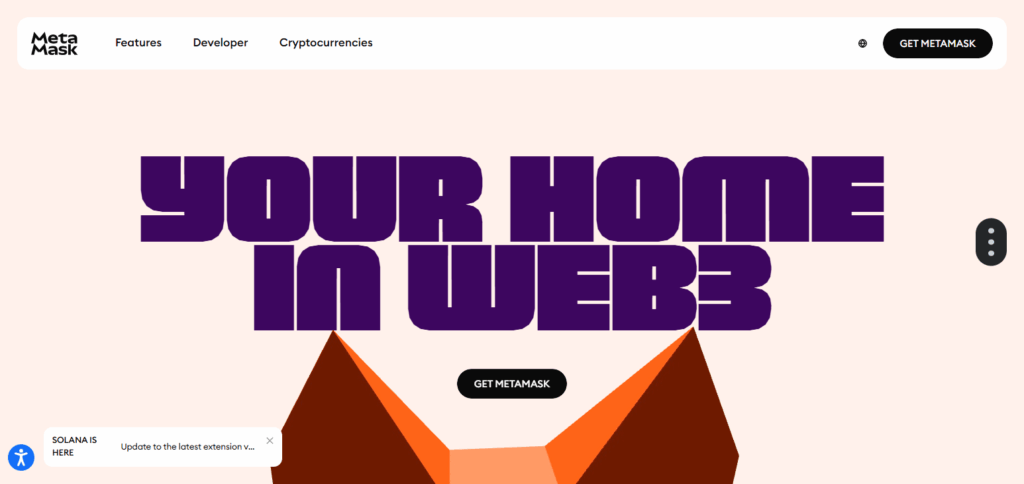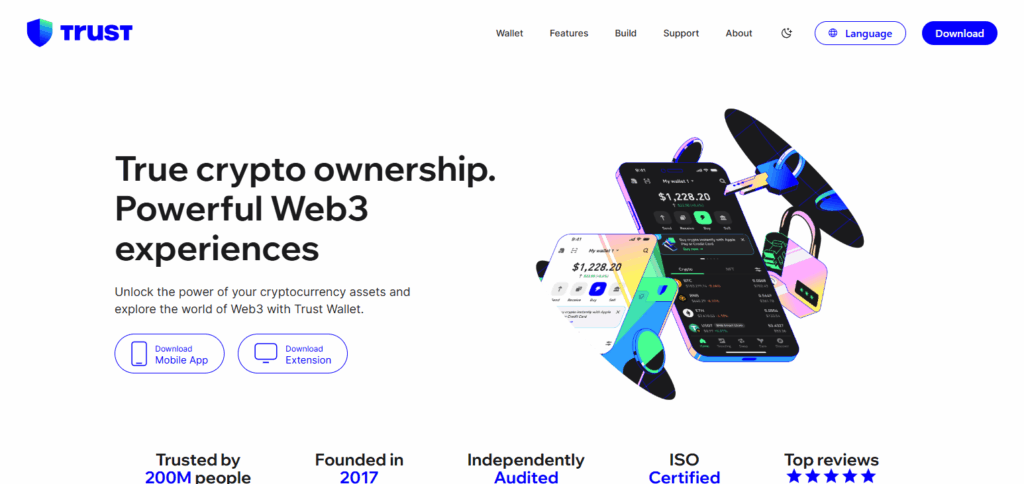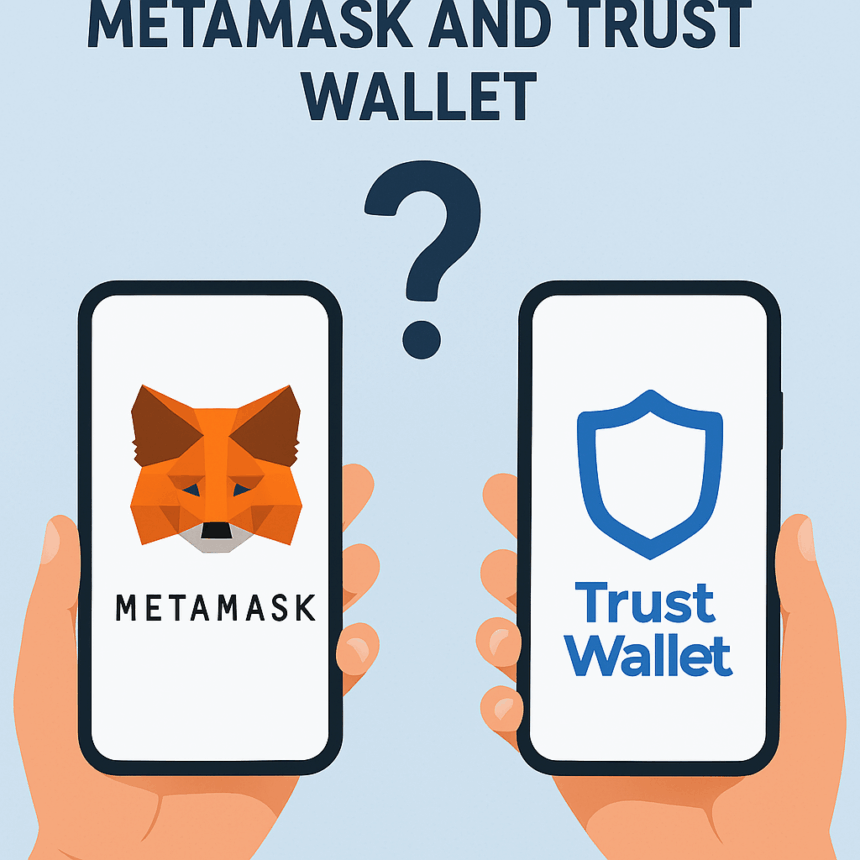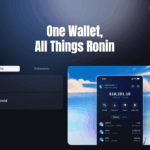In this blog, I will explain the How To Choosing Between Metamask And Trust Wallet. It will give you a broad understanding as to which crypto wallet suit your needs best.
Although both provide secure storage and access to decentralized applications, they vary in supported platforms, features, usability and overall ease of use. In this guide I hope to analyze these two crypto wallets in details so that your choice is made more easier.
What is Metamask?
MetaMask is one of the most known crypto wallets and serves as a gateway to blockchain applications as it lets users interact with the Ethereum blockchain and its vast ecosystem of decentralized apps (dApps).
MetaMask is available both as an extension on desktop browsers and in mobile apps, enabling users to send, receive, and store Ethereum along with other ERC-20 tokens safely.

More than just a wallet, MetaMask acts as a bridge between your browser and the blockchain which helps you control different personas, approve various transactions and navigate the entire Web3 world while keeping private keys safe.
Its user-friendly interface makes it a top choice for beginners and developers in venturing into DeFi, NFTs, and much more.
What is Trust Wallet?
Trust Wallet is a multi-cryptocurrency wallet and non-custodial which allows users to exchange and store digital assets securely. Ethereum, BNB Chain, Bitcoin and many more are some of the over 70 supported blockchains, alongside hundreds of thousands tokens.

Trust Wallet ensures privacy and ease of use by allowing the user full control over their private keys. It Bestows integrated DApp browsing that come with staking features as well as ability for token swaps which makes it appealing to novices and experts alike.
How To Choosing Between Metamask And Trust Wallet
Your choice of MetaMask or Trust Wallet will largely depend on your individual needs, preferred blockchains, and the level of user experience you expect. To assist you in making a choice, here is a breakdown:
Supported Blockchains
MetaMask: Ethereum and other EVM compatible chains like BNB Smart Chain, Polygon and Avalanche are mostly kept. However, it does not natively support Bitcoin.
Trust Wallet: Has wider coverage that includes Bitcoin, Ethereum, BNB Smart Chain, Solana among many others.
Platform Availability
MetaMask: Browser extension and mobile app.
Trust Wallet: Only mobile (iOS and Android); no desktop variant.
User Interface
MetaMask: More technical, ideal for developers/DeFi users Designed for beginners but may feel complicated to many.
Trust Wallet: Easy to use feature access such as staking and token swaps make this app streamlined with a neat design aimed at novices.
DApp Integration
MetaMask: Its extension allows users to access dApps that run on the browser seamlessly which is perfect for Web3 users.
Trust Wallet: It has its own built-in DApp browser but only on mobile devices which offer limited features compared to the MetaMasks Browser Extension.
Security & Custody
You don’t lose custody of your private keys since both wallets are non-custodial meaning you retain control over them with both using 12 word recovery phrases as backups.
Unique Features
With MetaMask one can set custom gas fees deal with hardware wallets and other sophisticated DeFi utilities through supported advanced ones.
Through Trust wallet; one could stake directly with built in staked services while integrating Binance DEX providing some NFT sidelines too.
What’s the Difference Between MetaMask and Trust Wallet?
While both MetaMask and Trust Wallet offer vital functionalities, they distinctively differ in security, multi-platform support, blockchain integration, and advanced features. Here’s how they stack up to each other:
What’s the Difference Between MetaMask and Trust Wallet?
MetaMask and Trust Wallet share many core functions, but they differ in terms of platform compatibility, blockchain support, and advanced features. Here’s a quick breakdown of how they compare:
| Feature | Trust Wallet | MetaMask |
|---|---|---|
| Supported Platforms | Available on iOS, Android, and Web (via WalletConnect) | Browser-based: Chrome, Firefox, Brave, Edge |
| Supported Coins | Wide range including Ethereum, ERC-20 tokens, BNB Chain, Polkadot, and others | Primarily Ethereum and ERC-20 tokens |
| Key Storage | Private keys stored securely on the user’s mobile device | Keys are saved within the browser extension |
| Gas Fee Control | Yes – users can manually adjust gas fees | Yes – gas customization available |
| Integrated Exchange | Built-in access to Binance DEX for quick trades | No built-in exchange functionality |
| Multisignature Support | Supports multisig wallets | Multisig not supported |
| DApp Browser | Includes a built-in DApp browser on mobile | DApp access through browser extension |
| Token Swap | Built-in token swap feature using Binance DEX | Swaps supported via third-party services |
| Staking Support | Yes – supports staking for select coins | No native staking option |
| Custom Fee Settings | Yes – highly customizable | Basic fee settings only |
Comparing MetaMask and Trust Wallet Fees
Both MetaMask and Trust Wallet strive to provide affordable services to users; however, each has a distinct approach to handling fees, depending on the activity performed.
Trust Wallet Fees
Often referred to as a ‘no fee wallet,’ Trust Wallet does not impose custodial fees and does not charge for watching DApps or performing token swaps within its built decentralized exchange. However, network fees still apply based on which blockchain you use. For BNB Chain transactions, costs are around $0.01-$0.03.
With trust free token swaps, users can buy fiat but through trust wallet incurs a 1 percent charge unless they have more than 100 TWT tokens (BEP2, BEP20 or SPL versions are fine).
MetaMask Fees
MetaMask charges 0.875 percent fee on token swaps which is captured in the transaction quote provided by the MetaMask interface. With rest of swap purchases of lesser value, unlike other exchanges zero additional payment selers are required however you will be billed separately on gas payments that vary with different blockchains.
After the London Fork update on Ethereum EIP-1559, flexible gas settings became available on MetaMask. There is now an option to set gas speed to either Low, Market, or Aggressive. Transaction prioritization can be done based on how much fee one is willing to pay.
The average transaction gas cost on Ethereum is around 21,000 Gwei but this value changes based on how busy the network is.
Purchasing Crypto: Third Party Charges
Both Trust Wallet and MetaMask do not perform direct fiat-to-crypto transactions as they rather use third-party services . These third-party services have separate charges which vary from provider to provider.
Some of the Partners include:
*For Metamask: Transak, Wyre, MoonPay, Coinbase Pay
*For Trust Wallet: Simplex, Ramp, Mercuryo, Wyre, Transak
Accepted payment methods consist of credit and debit cards, mobile wallets like apple pay , google pay and samsung pay as well as bank transfers such SEPA or ACH.
Cash-Out
Both crypto wallets do not allow users to sell crypto for cash directly. If you wish to sell your picked assets for cash you are required to move them into a platform that supports fiat withdrawals.
MetaMask vs. Trust Wallet: NFT Support
Both MetaMask and Trust Wallet offer NFT functionality, but their usability varies. MetaMask is designed for managing Ethereum-based NFTs; it does not excel at supporting collectibles from other blockchains.
Trust Wallet offers a better overall experience for NFT management. In addition to Ethereum, it supports multiple other blockchains. If you intend to collect NFTs across different platforms, Trust Wallet may be the easier option.
Tech Trust Wallet vs MetaMask: Which One is Better For You?
Both Trust Wallet and MetaMask are popularly known as non-custodial wallets which entails that users have complete control of their private keys. Also, they both operate under the open source model meaning that anyone can inspect, review as well as propose changes to the code.
In terms of security features both wallets are susceptible to the same type of threats which mostly surround user negligence. Both wallets can get attacked through phishing schemes, but, again, this lowers to user negligence so do your homework when it comes to securing your assets.
Trust Wallet Pros and Cons
To simplify the evaluation for you, here are the advantages and disadvantages of Trust Wallet focusing on how beneficial it can be for your crypto requirements.
Pros
- Wide Asset Support: Trust Wallet has a compatible cryptocurrency wallet for over fifty thousand cryptocurrencies and NFTs spanning Bitcoin, Ethereum, Solana, BNB Chain and more than seventy other blockchains.
- User-Friendly Interface: Its intuitive design ensures even beginners can easily navigate the crypto ecosystem.
- In-Wallet Features: There is no need to go to third party platforms because one can buy, swap and stake directly on the app.
- Non-Custodial & Secure: The Trust Wallet is non-custodial meaning one’s private keys are secure thus making in-app crypto transactions trustable. Furthermore, wallets are encrypted and put through audits ensuring safety.
- Mobile Convenience: Trust Wallet is available on both Android and iOS devices. It include dApps which allows users direct access within the app.
Cons
- No Two-Factor Authentication (2FA): Security Limitations: Compared to other wallets this stands out as a concern.
- No Desktop Version: Other than mobile interface there isn’t any other way to access Trust Wallet which might pose problems to users who prefer desktop version.
- Lack of Hardware or Cold Storage Integration: Ledger or Trezor cold storage hardware wallets aren’t supported by this application or software.
- Alongside these benefits also comes some risks due to the presence of affected tokens that may not have been rigorously examined before being added due to Trust Wallet supporting millions of assets.
MetaMask Wallet Pros & Cons
To help you consider the limitations and strengths of MetaMask, here is a current and comprehensive overview on its pros and cons:
Pros
- EVM Ecosystem Access: MetaMask supports Ethereum as well as EVM-compatible chains like BNB Chain, Polygon, and Arbitrum.
- Browser & Mobile Support: Works as a mobile app as well as browser extension so it is convenient for both desktop and mobile users .
- DApp Integration: Connects easily to decentralized apps (dApps) especially in DeFi, NFTs, and Web3 gaming.
- Custom Network Support: Allows addition of custom networks including testnets or Layer 2s manually.
- Hardware Wallet Compatibility: For additional protection, it works with Ledger and Trezor hardware wallets.
- Gas Fee Flexibility: Users can use tokens other than ETH to pay fees because of features like MetaMask’s Gas Station.
Cons
- Limited Blockchain Support: Does not support Bitcoin, Solana or XRP natively does non-EVM chains.
- High Fees: Charges a 0.875% fee on swaps, imposes 1% markup for fiat purchases, and takes 15% cut on reward staking
- No Built-in 2FA Lack of two-factor authentication may concern some user who prioritize ssecurity.
- Steeper Learning Curve: Geared towards advanced user so beginners might struggle due to overwhelming interface..
Conclusion
Your requirements and how you engage with the crypto world will dictate your choice between MetaMask and Trust Wallet. MetaMask works best for those who use Ethereum or EVM-compatible networks since it offers browser-based access to wallets.
If you want mobile convenience, support for multiple chains, integrated staking features, and a wide variety of cryptocurrencies, then Trust Wallet might fit you better.
Make sure to set your priorities first—platform, coins offered, wallet functions—and only then make a selection.









